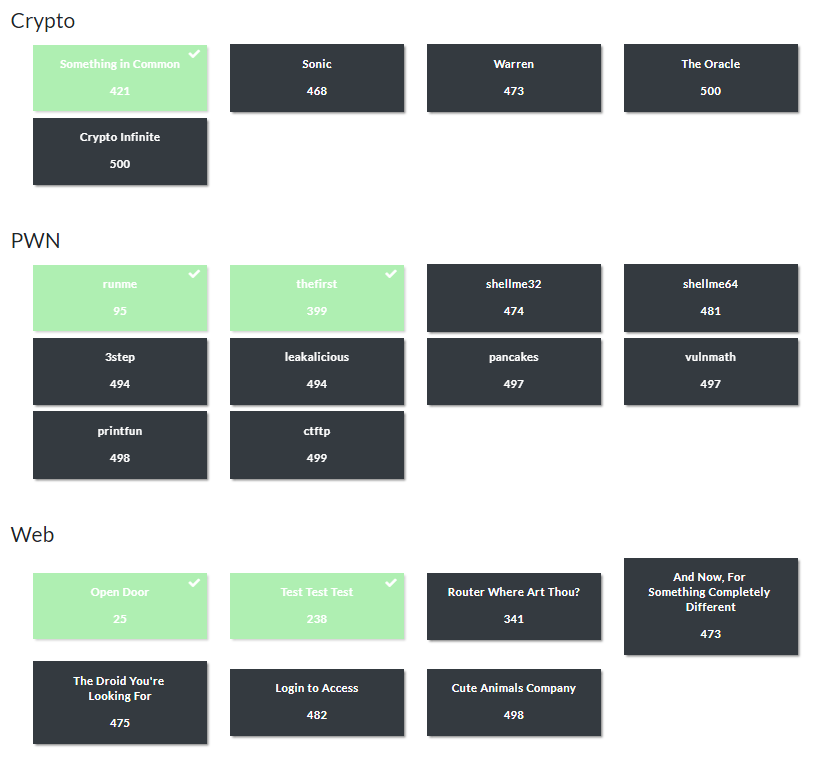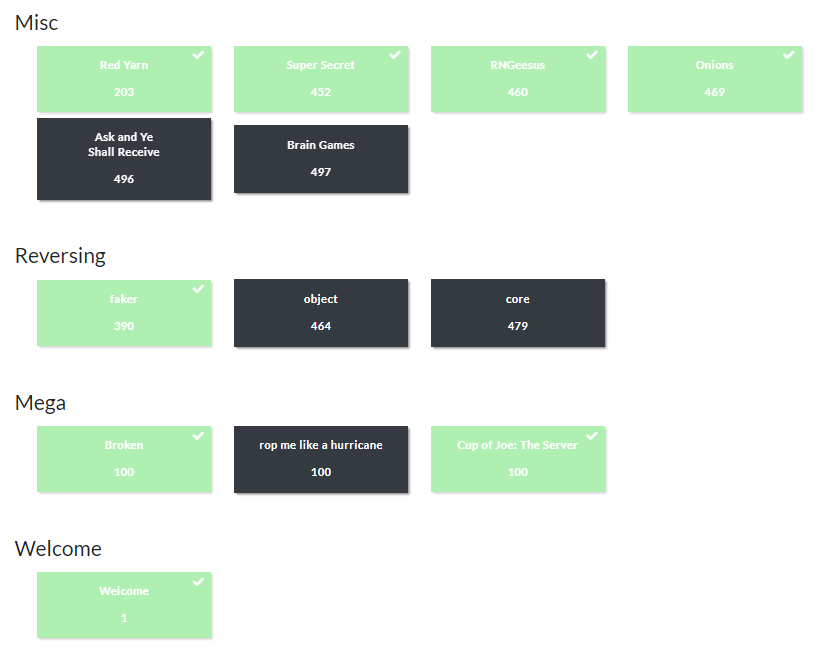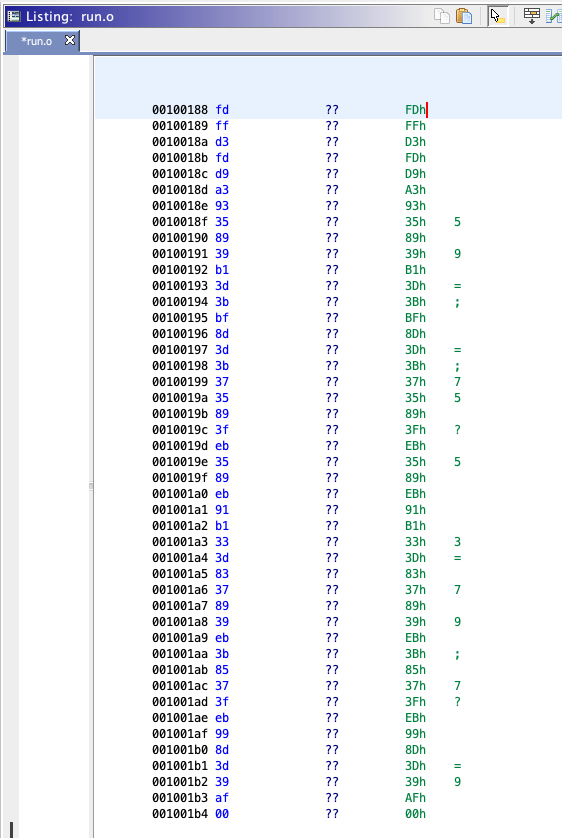TUCTF 2019 Writeup
Contents
(2019/12/25 - 復習しました)
URL: https://tuctf.com/
もうサイトにアクセスできないようなので、最終順位がわかりません。
以下、チャレンジ一覧と解いた問題です。


[Misc]: Onions
Challenge
Ogres are like files – they have layers!
Attachment:
- shrek.jpg
Solution
シュレックのJPEG画像です。著作権は大丈夫なんでしょうか。
foremostではなにも取れなかったので、binwalkから始めます。
binwalk -e でもextractされなかったので、–ddを使いました。
$ binwalk -e shrek.jpg
DECIMAL HEXADECIMAL DESCRIPTION
--------------------------------------------------------------------------------
0 0x0 JPEG image data, JFIF standard 1.01
275566 0x4346E 7-zip archive data, version 0.4
$ binwalk --dd='.*' shrek.jpg
DECIMAL HEXADECIMAL DESCRIPTION
--------------------------------------------------------------------------------
0 0x0 JPEG image data, JFIF standard 1.01
275566 0x4346E 7-zip archive data, version 0.4
$ cd _shrek.jpg.extracted/
$ file 0
0: JPEG image data, JFIF standard 1.01, aspect ratio, density 1x1, segment length 16, comment: "CREATOR: gd-jpeg v1.0 (using IJG JPEG v62), default quality", baseline, precision 8, 2048x1234, frames 3
$ file 4346E
4346E: 7-zip archive data, version 0.4
$ 7z x 4346E
7-Zip [64] 16.02 : Copyright (c) 1999-2016 Igor Pavlov : 2016-05-21
p7zip Version 16.02 (locale=en_US.UTF-8,Utf16=on,HugeFiles=on,64 bits,1 CPU Intel(R) Core(TM) i5-3230M CPU @ 2.60GHz (306A9),ASM,AES-NI)
Scanning the drive for archives:
1 file, 538 bytes (1 KiB)
Extracting archive: 4346E
--
Path = 4346E
Type = 7z
Physical Size = 538
Headers Size = 130
Method = LZMA2:12
Solid = -
Blocks = 1
Everything is Ok
Size: 428
Compressed: 538
$ tar zxvf flag.tar.gz
flag.cpio
$ cpio -idv < flag.cpio
flag.lzma
1 block
$ unlzma flag.lzma
$ file flag
flag: current ar archive
$ ar -x flag
$ file flag1.txt
flag1.txt: bzip2 compressed data, block size = 900k
$ bunzip2 -d flag1.txt
bunzip2: Can't guess original name for flag1.txt -- using flag1.txt.out
$ file flag1.txt.out
flag1.txt.out: XZ compressed data
$ xz -dv flag1.txt.out
flag1.txt.out (1/1)
xz: flag1.txt.out: Filename has an unknown suffix, skipping
$ mv flag1.txt.out flag1.xz
$ xz -dv flag1.xz
flag1.xz (1/1)
100 % 96 B / 40 B = 2.400
$ file flag1
flag1: ASCII text
$ cat flag1
TUCTF{F1L3S4R3L1K30N10NSTH3YH4V3L4Y3RS}
Flag: TUCTF{F1L3S4R3L1K30N10NSTH3YH4V3L4Y3RS}
[Misc]: Super Secret
Challenge
Something’s blocking my flag from this file…
Attachment:
- document.odt
Solution
$ file document.odt document.odt: OpenDocument Text
使っている Windows PC に OpenOffice がインストール済みだったので、マクロを無効な状態で開いてみました。
マクロの中身は以下で確認できました。
OpenOffice > ツール > マクロ > マクロの管理 > OpenOffice.org Basic > 編集
REM ***** BASIC *****
Sub Main
TUCTF{ST0P_TRUST1NG_M4CR0S_FR0M_4N_UNKN0WN_S0URC3}
End Sub
Flag: TUCTF{ST0P_TRUST1NG_M4CR0S_FR0M_4N_UNKN0WN_S0URC3}
[Misc]: RNGeesus
Challenge
RNGeesus has a secret technique, can you guess it?
nc chal.tuctf.com 30300
Solution
まずは繋げてみます。2回繋げて、毎回同じ問題であることを確認しました。
また、適当に答えを入れると、ググれ!というヒントがもらえました。
$ nc chal.tuctf.com 30300 Good afternoon, my children... I've overheard the prayers to RNGeesus, but he's got a terrible secret... He's just using rand() calls on his new Mac! If you can guess his next number, I'll even give you a flag. You ready to guess his next move? Here's his current random number. RNGesus gives the following number: 520932930 $ nc chal.tuctf.com 30300 Good afternoon, my children... I've overheard the prayers to RNGeesus, but he's got a terrible secret... He's just using rand() calls on his new Mac! If you can guess his next number, I'll even give you a flag. You ready to guess his next move? Here's his current random number. RNGesus gives the following number: 520932930 520932931 Easy! Alright, what's his next move? Hmm, that wasn't right. Try some more searching. There's source code out there somewhere! Better luck next time...
“520932930"でググると、いくつかサイトがヒットしました。
シード値(0)でrand()を実行した際の最初の結果が"520932930"で、次は"28925691"のようです。
Flag: TUCTF{D0NT_1NS3CUR3LY_S33D_Y0UR_LCGS}
[Mega]: Cup of Joe: The Server
Challenge
On the first leg of the journey, I was looking at all the life, there were plants and hills and rocks and things, there was java and mugs and caffeine.
chal.tuctf.com:32000
Solution
上記のウェブサイトにアクセスすると、以下にリダイレクトされます。
http://chal.tuctf.com:32000/coffeepot?
ソースを見てみます。
|
|
これは、エイプリルフールのジョークRFC(RFC 2324 - Hyper Text Coffee Pot Control Protocol)ですね。
RFCの存在は知ってましたけど、実際に使うのは今回が初めてです。
普通にGETを送ると、カフェインが足りないと言って怒られます。
GET /coffeepot? HTTP/1.1 Host: chal.tuctf.com:32000 Connection: keep-alive Cache-Control: max-age=0 Upgrade-Insecure-Requests: 1 DNT: 1 User-Agent: Mozilla/5.0 (Windows NT 6.2; Win64; x64) AppleWebKit/537.36 (KHTML, like Gecko) Chrome/78.0.3904.108 Safari/537.36 Accept: text/html,application/xhtml+xml,application/xml;q=0.9,image/webp,image/apng,*/*;q=0.8,application/signed-exchange;v=b3 Accept-Encoding: gzip, deflate Accept-Language: ja,en-US;q=0.9,en;q=0.8 HTCPCP/1.0 404 Not enough caffeine here :( Server: JavaServer Content-Length: 0 Content-Type: null
いろいろと試した結果、teapotに対してリクエストを送るのが正解でした。
$ curl -X BREW http://chal.tuctf.com:32000/teapot HTCPCP/1.0 418 I'm a teapot. Go to /broken.zip Server: JavaServer Content-Length: 0 Content-Type: Short and stout $ curl -X BREW http://chal.tuctf.com:32000/broken.zip HTCPCP/1.0 200 Success! Server: JavaServer Content-Length: 6965888 Content-Type: application/octet-stream Warning: Binary output can mess up your terminal. Use "--output -" to tell Warning: curl to output it to your terminal anyway, or consider "--output Warning:" to save to a file. $ curl -X BREW http://chal.tuctf.com:32000/broken.zip --output broken.zip % Total % Received % Xferd Average Speed Time Time Time Current Dload Upload Total Spent Left Speed 100 6802k 0 6802k 0 0 771k 0 --:--:-- 0:00:08 --:--:-- 1123k $ file broken.zip broken.zip: data $ unzip broken.zip Archive: broken.zip warning [broken.zip]: 110 extra bytes at beginning or within zipfile (attempting to process anyway) creating: broken/ inflating: broken/broken.img inflating: broken/flag.txt
broken.zip は fileコマンドでZipとして認識されませんが、unzipコマンドで普通に解凍できました。
Flag: TUCTF{d0_y0u_cr4v3_th3_418}
[Mega]: Broken
Challenge
Sometimes things that are broken have been broken on purpose.
Solution
添付ファイルがありません。どうやら、先程の問題で取れた broken.img を使うようです。
フラグはstringsで見つかりました。
Flag: TUCTF{D1S4ST3R_R3C0V3RY}
[Crypto]: Something in Common
Challenge
We’ve managed to gather the details in the given file. We need a professional cryptographer to decipher the message. Are you up to the task?
Attachment:
- rsa_details.txt
以下が中身です。
n = 5196832088920565976847626600109930685983685377698793940303688567224093844213838345196177721067370218315332090523532228920532139397652718602647376176214689
e1 = 15
e2 = 13
c1 = 2042084937526293083328581576825435106672034183860987592520636048680382212041801675344422421233222921527377650749831658168085014081281116990629250092000069
c2 = 199621218068987060560259773620211396108271911964032609729865342591708524675430090445150449567825472793342358513366241310112450278540477486174011171344408
Solution
“rsa ctf c1 c2 e1 e2"とか、“Common Modulus Attack” をキーワードにでググるのがコツです。
過去のCTF (Square CTF 2018) でほぼ同じ問題があり、Writeupが見つかります。
他の方が書いたWriteupそのままになっちゃうので、ここにはコードは載せません。
$ python rsa_common_solve.py
TUCTF{Y0U_SH0ULDNT_R3US3_TH3_M0DULUS}
Flag: TUCTF{Y0U_SH0ULDNT_R3US3_TH3_M0DULUS}
[Crypto]: Crypto Infinite
Challenge
Crypto has been around forever. Does this challenge go on forever? Let us know in the comments below or find the flag to prove us wrong.
nc chal.tuctf.com 30102
Unsolved
これは解けませんでした。。。
無駄にレベルが分かれていて、Level 0 ~ 4 は全く同じコードで解けたので、そこまでを載せておきます。Level 5以降は不明です。
まずncでアクセスしてみます。
$ nc chal.tuctf.com 30102 Welcome to the future. Can you discover infinity? Level 0 Give me text: a A encrypted is _| Decrypt .-| |.- [. .-| |.- |- [] > _| |.- .< Too slow!
次は、AからZまで入れてみました。
$ nc chal.tuctf.com 30102 Welcome to the future. Can you discover infinity? Level 0 Give me text: ABCDEFGHIJKLMNOPQRSTUVWXYZ encrypted is _| |_| |_ ] [] [ -| |-| |- ._| |._| |._ .] [.] [. .-| |.-| |.- v > < ^ .v .> .< .^ Decrypt .] |- [.] < v |_ < |._ [] Too slow!
Encryptedの部分をスペース区切りとみなすと26パターンあり、アルファベットの各文字に対応しているようです。
以下、が書いたスクリプトです。(たぶん途中のやつ。この後、更に編集したのが別PCに残っているので、後で差し替えておきます。)
(2020/05/06 - 差し替えたんだっけ? もう覚えてないや。。。)
|
|
[Reversing]: faker
Challenge
One of these things is not like the other. Can you uncover the flag?
Hint: Is there anything hidden inside the binary?
Attachment:
- faker (ELF 64-bit)
Solution
Ghidraでコードを確認します。printFlag()という関数と、それを呼んでいるA(), B(), C()関数が見つかります。
|
|
main()をくっつけて、コンパイルして実行してみます。
|
|
以下が結果です。どれもFake Flagっぽいです。
$ ./faker_solve.o
TUCTF{n0p3_7h15_15_4_f4k3_fl46}
TUCTF{50rry_n07_h3r3_317h3r}
TUCTF{600d_7ry_bu7_k33p_l00k1n6}
GhidraでStringsサーチしたら、似たようなものがもう1個見つかりました。

同じようにコンパイルして実行するとフラグが得られます。
Flag: TUCTF{7h3r35_4lw4y5_m0r3_70_4_b1n4ry_7h4n_m3375_7h3_d3bu663r}

ここから下はCTF終了後に行った復習です。(他の方のWriteupとか参照してます。)
[Reversing]: object
Challenge
We’ve recovered this file but can’t make much of it.
Hint: Do you see a procedural way to recover the password?
Attachment:
- run.o (ELF 64-bit)
Solution
Ghidraでソースを確認します。
|
|
入力したパスワードを1文字ずつ処理しています。(whileのすぐ下のところ)
左シフトしたものを、反転 (XOR 0xFF) して、さらに XOR 0xAA したものを、比較用データと比較してます。
比較用データもGhidraで見つかりました。

XOR 0xAA の XOR 0xFF は XOR 0x55 なので、この比較用データを XOR 0x55 してから右シフトします。
python3 -c 'print(*[chr(((int(x,16))^0x55)>>1) for x in "FD FF D3 FD D9 A3 93 35 89 39 B1 3D 3B BF 8D 3D 3B 37 35 89 3F EB 35 89 EB 91 B1 33 3D 83 37 89 39 EB 3B 85 37 3F EB 99 8D 3D 39 AF".split()])' | tr -d " "
TUCTF{c0n6r47ul4710n5_0n_br34k1n6_7h15_fl46}
Flag: TUCTF{c0n6r47ul4710n5_0n_br34k1n6_7h15_fl46}
Tips
python3にて、listに*を付けることで、要素のみを空白区切りで出力することができます。
[Reversing]: core
Challenge
We were able to recover a few files we need analyzed. Think you can get anything outta these?
Hint: How is the data manipulated before the crash? Do you know any of the characters?
Attachment:
- run.c
- core
run.cの中身:
|
|
Solution
gdbでcore解析しようとして、分からなかったやつです。
run.c をベースに、フラグの一部 TUCTF をXOR ^ 1したものを、coreに対してstringsサーチするだけでした。
Flag: TUCTF{c0r3_dump?_N3v3r_h34rd_0f_y0u}
Author CaptureAmerica @ CTF フラxxグゲット
LastMod 2019-12-25
